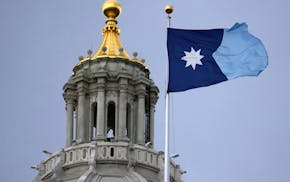The disarray in the nonfunctioning Minnesota House comes down to five words in the state Constitution: "A majority in each house," state Solicitor General Liz Kramer told the Minnesota Supreme Court on Thursday.
"The question is whether a vacancy in either house reduces the number necessary for a quorum or whether the quorum number is static," Kramer said in her opening comments on behalf of Secretary of State Steve Simon. A quorum refers to the number of members who must be present to conduct business.
Simon's position, and that of the House DFL, is that a quorum is 68 of the 134 House members, one more than half. Republicans argue they can do House business with 67 members. The GOP attorney also argued the court should stay out of a legislative dispute.
For more than an hour, six justices vigorously questioned attorneys for Simon, the Democrats and the Republicans in the highly unusual case that could decide whether the GOP gets to run the House for the next two years or must share power.
Chief Justice Natalie Hudson gave no indication of how or when the court would rule, but a decision is expected soon, given the current inability of the House to pass bills.
The dispute dates to the first day of session, Jan. 14, when the Democrats boycotted the House in an attempt to deny the Republicans a quorum. Simon, presiding on opening day, determined a quorum to be 68 members and didn't convene the House. But the 67 Republican members went ahead and met, selected a speaker and committee chairs.
During the hearing Thursday, Hudson spoke first, telling Kramer that the DFL's interpretation of state law seemed "reasonable." She then added that the GOP position was "at least equally reasonable."
The Republicans and DFL agree on one thing: It takes 68 House members to pass laws. But Nicholas Nelson, attorney for the GOP caucus, said legislators can do all other business with just 67 members.
Justice Theodora Gaïtas pressed Nelson on the requirement of 68 votes to pass bills. "They can meet, but they can't pass laws under your own argument," she said. "Isn't that a significant flaw with your argument?"
Nelson said the Republicans can do everything but enact legislation. "There is no grand theory that makes all of this language consistent," he said.
In questioning Kramer, Hudson mentioned a previous court ruling that raised concerns about a minority of members wielding power over a majority. "That's a little bit like what's happening now because the Democrats are not in the majority," Hudson said.
Kramer said the number for a quorum has to be static. "If the court says the quorum can be reduced when there are vacancies," for example, created by the death of a member, "a minority faction would all of a sudden be able to exercise control," she said.
Asked by Gaïtas to point to the best evidence for the DFL position, Kramer cited two previous cases and past practices as determining the threshold for a two-thirds vote. In those situations, she said, the common denominator was 134, the entire House.
Justice Gordon Moore asked whether the court should steer clear of the dispute so it's not "viewed by parties as a place to resolve political disputes."
Kramer countered that the Supreme Court had done so before by entering a 1971 dispute when Lt. Gov. Rudy Perpich, presiding over the state Senate, declined to seat a senator because of an election challenge.
In arguing on behalf of the House DFL, attorney David Zoll opened by saying, "The issue today is neither political nor partisan. It's a question of constitutional law."
The state Constitution, he said, created a House with 134 members and a quorum is necessary to take action, he said.
Justice Anne McKeig asked whether the DFL had "unclean hands" given its boycott. "This court is not going to give weight to returning them to this power-sharing agreement," she said.
Zoll said the DFL seeks to restore the status quo that existed before the GOP met on its own and elected Rep. Lisa Demuth, R-Cold Spring, as speaker.
Gaïtas added, "We have to consider whether we can provide redress for the problem that's been created."
Zoll said the remedy is to void the GOP's actions. When Hudson asked what would happen then, Zoll said Simon would convene the House if a quorum existed and the chamber could take action.
The chief said, "So that could go on day after day after day, is that right?" Zoll responded, "That's how the Minnesota Constitution is set up."
In his argument, Nelson urged the court not to intervene. He said judicial power involves reviewing statutes, not an "alleged quorum problem" of the DFL's making.
Hudson asked him whether it wasn't the role of the judiciary to interpret the law on urgent matters.
"What we have is a co-equal branch of government that is completely dysfunctional, that is not doing the will and the work of the people of Minnesota," she said.
Nelson responded that it's the job of the House, not the court, to resolve the dispute.
Gaïtas sounded skeptical about the GOP urging the court to steer clear of the matter, given its role in interpreting the Constitution. "Isn't that our thing? Isn't that what we do as a Supreme Court?" she asked.
Hudson noted that the court had intervened in the 1971 matter involving Perpich and the Senate. Nelson responded that was an "inter-branch dispute."
The chief justice countered that in the current matter, Republicans had argued that Simon's determination that a quorum is 68 members was an "egregious overreach" of his authority. "I grant you that it is primarily a legislative dispute," Hudson said, but said Simon's involvement also pulled in the executive branch.
"I don't know that you can put it back in this little bitty bucket in terms of the House's internal regulations," she said.
At one point, Justice Paul Thissen, himself a former state House speaker, told Nelson his argument about statutes was "weird," and Hudson said the Republican arguments circled back to the Constitution.
Justice Karl Procaccini has recused himself from the dispute without giving a reason, as is customary, and was not present.
Minneapolis Council Vice President Chughtai fails to win DFL endorsement; assault allegations fly

A 23-year-old woman was killed in 'war zone' shooting at Minneapolis' Boom Island park

